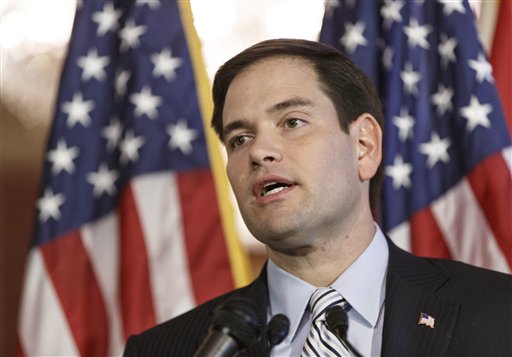(AP) Republicans promote ways of helping the poor
By KEN THOMAS
Associated Press
WASHINGTON
Faced with an empathy gap before the 2014 midterm elections, Republicans are trying to forge a new image as a party that helps the poor and lifts struggling workers into the middle class.
GOP leaders are using the 50th anniversary of President Lyndon B. Johnson’s War on Poverty to offer a series of policy proposals that would shift anti-poverty programs to the states, promote job training and offer tax incentives for low-income workers.
The effort aims to offer an alternative to President Barack Obama’s economic agenda and shed the baggage of Mitt Romney’s 2012 presidential bid, which was hurt by his suggestion during a private fundraiser that 47 percent of Americans are dependent on government, view themselves as victims and won’t take responsibility for themselves.
The new-year push comes as Obama is pressuring Republicans to extend unemployment insurance and preparing to highlight income inequality in his State of the Union address later this month. The president is expected to seek an increase in the federal minimum wage from $7.25 an hour and discuss ways to help the nearly 50 million Americans living in poverty.
For Republicans, the challenge is to offer a better way.
In a speech Wednesday in an ornate Capitol room named after Johnson, Florida Sen. Marco Rubio said government anti-poverty programs are only a partial solution at best.
Rubio said anti-poverty programs have been bogged down by federal bureaucracy and could be run better by the states. He called for replacing the earned income tax credit for low-income workers with a federal wage enhancement for low-wage workers as a way to create incentives for the poor to work instead of receiving unemployment insurance.
Democrats noted that Rubio and many other Republicans have come out against a three-month extension of unemployment insurance and an increase in the federal minimum wage, which has not been raised since 2009.
Republicans say raising the minimum wage and repeatedly extending unemployment benefits fail to address the root causes of a complex problem. But a consensus on an alternative way to address these problems remains elusive as several prominent party leaders _ including those considering 2016 presidential bids _ have sought ways to connect with the poor and working-class voters.
Wisconsin Rep. Paul Ryan, Romney’s running mate, was speaking Thursday evening at a network television event marking Johnson’s anti-poverty push and planned to address social mobility at a forum Monday. Ryan has met with community leaders and the poor in Milwaukee, Cleveland and Indianapolis during the past year to learn about addressing poverty and is expected to propose ways to improve federal poverty programs later this year.
Kentucky Sen. Rand Paul, another potential 2016 presidential candidate, traveled to Detroit in December to promote “economic freedom zones” as a way to encourage investment in impoverished urban areas.
Ohio Gov. John Kasich has pushed to expand Medicaid for the poor in his state despite Republican opposition in the Legislature and frequently preaches a mantra of compassion for the less fortunate.
In October, former Florida Gov. Jeb Bush paid tribute to the late Rep. Jack Kemp, R-N.Y., a mentor of Ryan’s who was an advocate for using tax breaks to bolster jobs and investment in cities. “He knew conservative policies could, and should, be attractive across races, across income brackets and across cultures because they are the policies of aspiration and equality,” Bush said.
Alex Castellanos, a Republican strategist who has pushed ways for the GOP to rebrand itself, said the party is “transforming itself from a party that believes its principles are only good for saying `no’ to a party that believes its ideas are the best way to lift all Americans from poverty and economic insecurity. That can make the GOP a party that sings to more than its own shrinking choir.”
Yet recent polls underscore the obstacles for Republicans. An Associated Press-GfK poll in October found that just 16 percent of adults thought “compassionate” described Republicans very or somewhat well, while 80 percent said it did not describe Republicans well. For the Democratic Party, 36 percent thought “compassionate” described the party well and 60 percent said it did not.
An NBC News/Wall Street Journal poll released in December found 45 percent felt the Democratic Party was better at “showing compassion and concern for people,” while 17 percent thought the Republicans were better on that front.
Bob Woodson, the founder of the Center for Neighborhood Enterprise, which works with community organizations and churches to help low-income residents, said Republicans have often fallen into the trap of fighting with Democrats over the minimum wage and unemployment insurance instead of offering more comprehensive ideas to promote business development, job training and homeownership in poor neighborhoods.
___
Follow Ken Thomas on Twitter: https://twitter.com/AP_Ken_Thomas

COMMENTS
Please let us know if you're having issues with commenting.